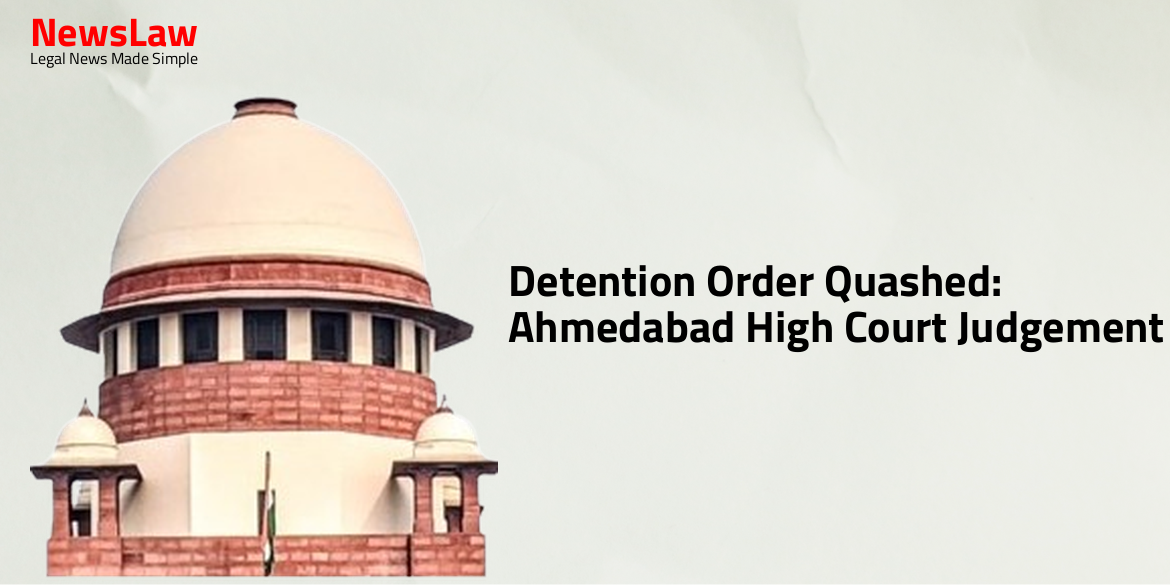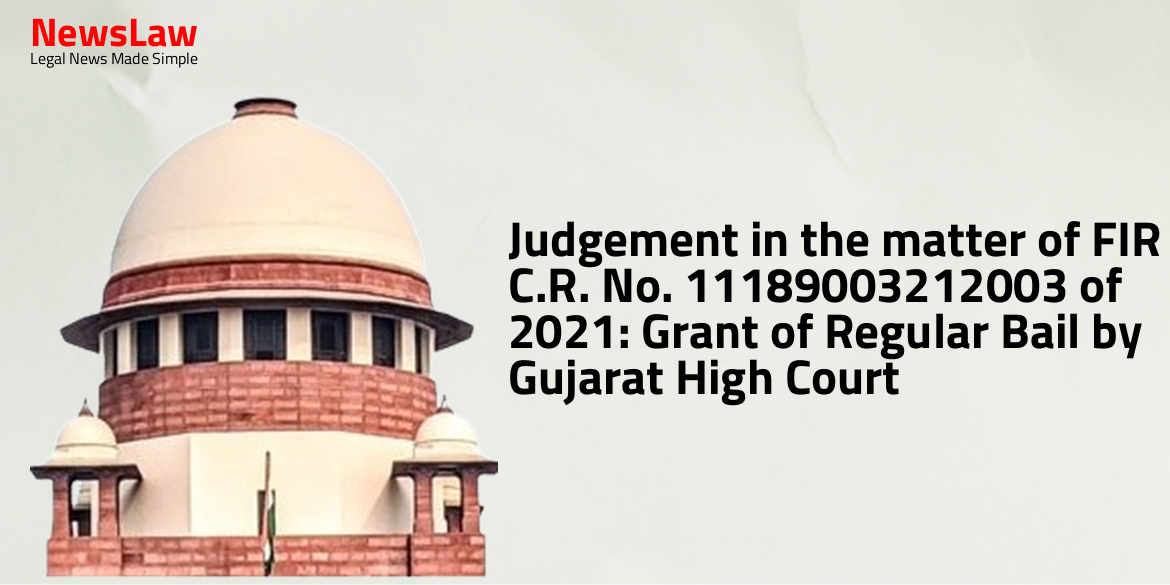In a recent landmark judgement by the Gujarat High Court, a detention order issued by the Commissioner of Police, Ahmedabad City, has been quashed. The court found that the detaining authority’s subjective satisfaction was vitiated and lacked substantial evidence to support the detention of the individual. The order, dated 07.11.2023, was found to be improper as it did not establish a clear connection with the breach of public order. This decision marks a significant win for upholding legal rights and justice in the state.
Facts
- Petitioner detained under PASA Act by Commissioner of Police, Ahmedabad City.
- Detention order dated 07.11.2023 challenged by the petitioner.
- Grounds of detention based on two theft offenses registered against petitioner at Sola Police Station and Sabarmati Police Station.
- Petitioner granted regular bail by competent court in connection with both offenses.
Arguments
- Learned advocate argues that sponsoring authority could have chosen to cancel bail instead of passing detention order
- Petitioner was released on bail for both offences on 03.11.2023 and 04.11.2023
- It is suggested that petitioner’s activities would only disturb law and order, not breach public order
- Detaining authority could have chosen to cancel bail instead of passing detention order
- Detaining authority deemed alleged activities as a threat to public order
- Detention order passed on 07.11.2023
Analysis
- The detaining authority’s subjective satisfaction was found to be vitiated as there was only disorder and not public disorder in the situation at hand.
- Merely disturbing law and order leading to disorder is not sufficient for action under the Preventive Detention Act; it must be a disturbance capable of affecting public order.
- The detaining authority did not appear to have arrived at subjective satisfaction before issuing the detention order.
- The alleged illegal activities of the detenue were not shown to adversely affect or likely affect public order.
- The fact that two theft cases were registered against the detenue does not automatically impact public order.
- A distinction was made between ‘law and order’ and ‘public order’ as discussed in the case of Pushker Mukherjee v/s. State of West Bengal [AIR 1970 SC 852].
- Assault or injury to specific persons, though constituting an act of disorder, does not necessarily disturb public order unless it affects the community or the public at large.
- The detenue, having been released from jail on one case, was then detained soon after in connection with a different incident.
- The court must distinguish between serious and aggravated forms of disorder with a direct impact on the community or public interest, and minor breaches of peace with primarily local significance
- Serious disorders directly affect the community or public interest, while minor breaches of peace primarily harm specific individuals
- The distinction is essential in addressing the level of harm caused and the impact on public interest
- Serious disorders may require more severe consequences or penalties compared to minor breaches of peace
- The order of detention was passed without resorting to the lesser drastic remedy of cancellation of bail first.
- The possibility of cancelling bail as a less severe measure was overlooked in this case.
- The detention order was issued directly without considering alternative options.
- The Court did not follow the usual sequence of actions in this case.
- The recent decision of the Hon’ble Supreme Court in the case of Shaik Nazeen v/s. State of Telangana and Ors. emphasized that subjective satisfaction can be vitiated.
- The court highlighted that if the detenu is a menace to society, the prosecution should opt for cancellation of bail or appeal to the Higher Court, rather than seeking preventive detention.
- The court concluded that in the present case, the mere registration of FIRs does not establish a connection with the breach of ‘public order’, making it improper to invoke powers under section 3(2) of the Act.
- Therefore, the petition is allowed as there is no relevant and cogent material to support the invocation of powers under the Act.
Decision
- Direct service is permitted in this case.
- The impugned order of detention is found to be vitiated.
- The order of detention dated 07.11.2023 is quashed and set aside.
- The detenue is ordered to be set at liberty forthwith, unless required in connection with any other case.
Case Title: NARESH @ BHOLAJI PRAHLADJI THAKOR Vs. COMMISSIONER OF POLICE, AHMEDABAD
Case Number: R/SCA/20587/2023



